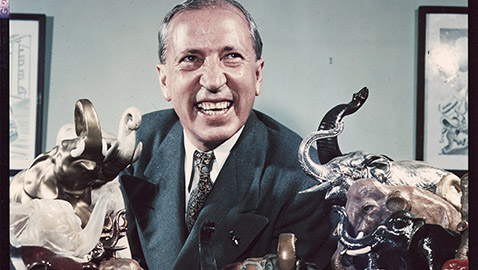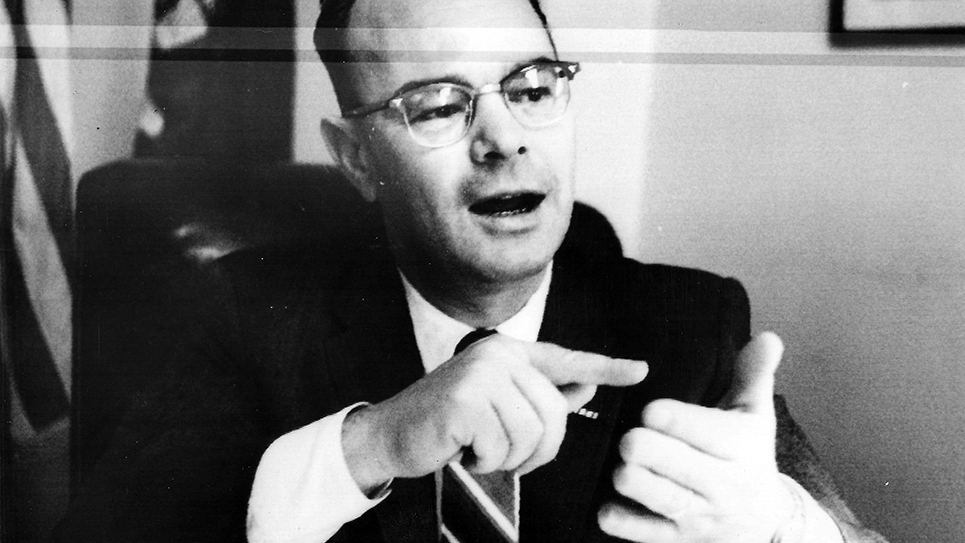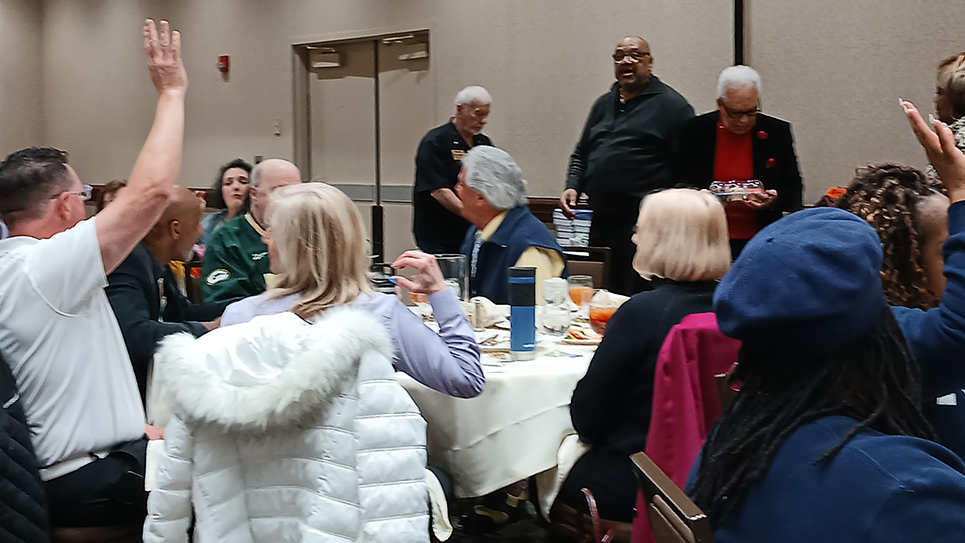By Ray Hill
For forty years, Brazilla Carroll Reece had been the congressman from the highly Republican First Congressional District of Tennessee with a few interruptions. Carroll Reece had first gone to Congress in 1920 after beating an entrenched incumbent in a heated GOP primary. For the next decade, Sam Sells, the defeated congressman, and his supporters promoted various candidates to challenge Reece. In 1930, Reece’s congressional service was disrupted in the most unthinkable way; Oscar Byrd Lovette, a former district attorney general from Greeneville, waged a quixotic sixteen-day campaign in the general election as an Independent. The issue was the development of Muscle Shoals, the forerunner of the Tennessee Valley Authority. Reece was largely supporting President Herbert Hoover, who favored private power rather than public power. As it happened, even Republicans in Tennessee were fierce supporters of the concept of public power and the benefits it would bring the region. Carroll Reece was upset in the general election after a decade of service in the House of Representatives.
The former congressman never stopped campaigning to regain his seat in Congress following his defeat. Reece also changed his position on the question of water power; he would be an advocate for and supporter of the Tennessee Valley Authority in the future. Most of the Republicans serving with Reece were fierce opponents of TVA and when they asked their friend from Tennessee how he could support the agency, the congressman would reply one could not be elected in the Volunteer State “by doing the other.” In short, nobody could be elected to any public office in the State of Tennessee who opposed the Tennessee Valley Authority. Reece showed his political acumen and his relentless campaign style in beating Congressman O. B. Lovette not once, but twice in 1932. Carroll Reece won a bitterly fought GOP primary and again bested Lovette when the congressman declared the results from the primary election to be corrupt and waged yet another Independent campaign in the fall. Sam R. Sells died in November of 1935 and O. B. Lovette had died in July of 1934; with his two most implacable opponents gone, much of the opposition to Reece inside the Republican Party seemed to subside. By 1940, Carroll Reece had made the First Congressional District his own; the Reece political organization was the same as that of the Republican Party inside the First District.
During Carroll Reece’s time in Congress, the Republican Party was a distinct minority in Tennessee and virtually non-existent in the one-party South. In Tennessee, Republicans were largely confined to the First and Second Congressional Districts. In November of 1939, Reece’s colleague in Congress and sometime rival in the GOP, J. Will Taylor died suddenly. Reece replaced Taylor as Tennessee’s Republican National Committeeman, a post he held for the remainder of his life.
Carroll Reece was unusual in being a successful Republican below the Mason – Dixon Line, but also in being a figure of ever-increasing importance inside the GOP. In 1946, Carroll Reece was elected as Chairman of the Republican National Committee. It was Carroll Reece who quarterbacked the most successful campaign waged by Republicans since the advent of Franklin D. Roosevelt and the New Deal. Republicans took advantage of voter frustration over deprivations enforced by the Second World War and campaigned on the simple yet highly effective slogan “Had Enough?” Carroll Reece presided over a sweeping victory that saw Republicans win twelve seats in the United States Senate and fifty-five seats in the House of Representatives. Republicans won a majority in both houses of Congress. Reece had also voluntarily given up his seat in the House to concentrate all his energies on his responsibilities as Chairman of the RNC.
Irrespective of his electoral success, Reece was viewed with suspicion by most of the Eastern Republican establishment. Carroll Reece was a thoroughgoing conservative and viewed as a supporter of Ohio U. S. senator Robert A. “Bob” Taft, who was a perennial candidate for the GOP presidential nomination from 1940 to 1952. New York Governor Thomas E. Dewey beat Taft for the 1948 GOP presidential nomination and unceremoniously dumped Reece as Chairman of the Republican National Committee. At least outwardly, Carroll Reece showed no bitterness and the prospects of yet another Republican sweep seemed so bright, that the former congressman came home to Tennessee and announced his candidacy for the United States Senate. Tennessee Democrats had been busy tearing themselves apart in a no-holds-barred fight in their own primary contests. Governor Jim Nance McCord had convinced the legislature to finally pass a sales tax, largely to finance education, both higher and secondary, in Tennessee. McCord was facing a difficult campaign against former governor Gordon Browning and must have been dismayed when most educators lined up behind his opponent. Senator Tom Stewart had lost the support of E. H. Crump, head of the Shelby County political machine, in favor of an unknown judge of the Circuit Court from Cookeville, John A. Mitchell. It was one of the worst mistakes of the Memphis Boss’s long political career and ended the domination of the McKellar-Crump axis in Tennessee politics. Estes Kefauver, a rather liberal congressman from Chattanooga, was running for the senatorial nomination and Crump’s refusal to back Senator Stewart for reelection gave Kefauver the opening he needed. Browning and Kefauver won their respective primaries. E. H. Crump bolted the Democratic Party by refusing to support President Harry Truman, preferring instead to back Strom Thurmond and the “Dixiecrats.” Tennessee Republicans saw a glimmer of hope the Memphis Boss would also refuse to support Browning and Kefauver in the general election.
Hopeful Republicans nominated Roy Acuff, the legendary country music entertainer, for governor and Carroll Reece for the United States Senate. Democrats were immediately alarmed by the thousands of voters who came to the Republican rallies to hear Roy Acuff and his Smoky Mountain Boys perform. Reece waged the first serious senatorial campaign by a Republican in Tennessee since former governor Ben W. Hooper ran in 1916, the first time Tennesseans selected a senator by popular election. Thomas E. Dewey not only lost to underdog Harry Truman, but he took most of the Republican ticket with him. Carroll Reece won only roughly a third of the ballots cast in the 1948 general election despite an intensive and expensive campaign.
Carroll Reece remained highly popular with the people of Tennessee’s First Congressional District and in 1950 he announced he would challenge his successor in Congress, Dayton Phillips, for the GOP nomination in the Republican primary. Phillips had voted against the Taft – Hartley labor bill and was a more liberal Republican, but very popular, especially inside an area of counties he had represented as a local district attorney. Reece reestablished his dominance as the most popular politician in the First District when he defeated Congressman Phillips to return to the House after a four-year absence.
Reece retained his national prominence inside his own party and was the Southern manager for Robert Taft’s last bid for the GOP presidential nomination in 1952. When Dwight Eisenhower won instead, Reece backed the highly popular former general and was elated when Tennessee fell into the Republican column. Carroll Reece felt somewhat threatened by a group of Republicans who were original backers of Eisenhower in the Volunteer State who proposed to approve all the patronage recommendations in Tennessee rather than Republican National Committeeman Reece. President Eisenhower found he absolutely had to have the vote of Congressman Carroll Reece in the House Rules Committee to move one of his legislative priorities. Reece changed his vote and remained the patronage boss in Tennessee during the Eisenhower administration. Nobody understood practical politics better than Carroll Reece who gave the newcomers a valuable lesson.
Carroll Reece remained an institution inside his own congressional district and easily turned back the occasional challenge inside the primary. The 1960 election was Carroll Reece’s last campaign. Congressman Reece faced no opposition in the Republican primary and swept past frequent congressional candidate Arthur Bright in the general election. Reece was delighted when his friend Vice President Richard Nixon carried Tennessee over John F. Kennedy. Disappointed by Nixon’s narrow loss, Reece was the chairman of the birthday festivities for Nixon at the Capitol in January of 1961. Reece, resplendent in a tuxedo, carried his seventy-one years well and his white hair was highlighted by the deep tan the congressman kept from hours in the sun at his vacation home in Florida. As it turned out, Congressman Carroll Reece was seriously ailing. Newspapers in Tennessee reported the congressman was at Bethesda Naval Hospital in late January of 1961 being treated for pleurisy, a painful condition of the lungs that impaired breathing, Reece had suffered from such issues ever since having been gassed during the First World War.
As Reece lay ill in Bethesda, the Rules Committee was undergoing a critical fight between the new Kennedy administration and conservative opponents. Reece wrote to Carl Jones, publisher of the Johnson City Press Chronicle, that his doctors were confident “of clearing up” the congressman’s illness “shortly” and he hoped to be present to vote. Carroll Reece did indeed return to Capitol Hill where he was greeted by his Republican colleague, Howard Baker (father of the future U. S. senator). Reece voted against the proposal to enlarge the House Rules Committee, which was being pushed by House Speaker Sam Rayburn to aid the legislative program of President Kennedy. The full House voted 217 – 212 to approve Rayburn’s request. Although largely downplayed by the congressman’s office, Reece had left his sickbed at the Naval Hospital to come and cast his vote and returned later that same day. On February 2, Carroll Reece’s office announced the congressman had undergone an operation on one of his lungs as the Nashville Banner reported. According to the congressman’s office, the operation was to correct “a condition” in Reece’s lung. The day after that announcement came another from one of the congressman’s aides who said the surgery had been delayed so that doctors could take tissue samples of Reece’s lungs. One indication of how truly sick Reece was is the fact that his trip to and from the Capitol had been by ambulance.
The congressman’s wife, Louise, issued the next news bulletin following “minor” surgery performed on Reece. According to Louise Reece, the congressman was “feeling fine” following the operation and was not confined to his bed, but rather wandering the halls of the hospital and watching television. Mrs. Reece estimated the congressman would remain at Bethesda Naval Hospital for another two weeks. Reece was well enough to leave the hospital to attend a meeting of the House Rules Committee before returning to Bethesda. Yet again, Reece insisted he was “feeling fine.” Periodic announcements came from the Naval Hospital with Louise Reece reassuring reporters her husband was responding to the treatment he was receiving and his physicians were pleased with the congressman’s progress.
The true nature of Carroll Reece’s lung ailment was Stage Four lung cancer. It is almost certainly true that the congressman and his family believed he was suffering from the effects of having been gassed, but at some point, doctors at Bethesda revealed the true nature of his illness. News stories appearing in Tennessee newspapers reporting Reece’s improvement were routine, yet, at best, wishful thinking and at worse, simply deceptive. Reece was released from the Naval Hospital on February 28, 1961, after having been confined for six weeks. Louise Reece spoke with reporters and said the congressman would continue going to Bethesda for daily treatment but refused to say exactly what he was being treated for; Mrs. Reece hastily added her husband was recovering from a case of pleurisy. Congressman Reece was present to vote for the extension of unemployment benefits. By mid-March, Carroll Reece was slipping away. Louise Reece, Reece’s eldest grandchild, recalls her mother being told that if she wished to see her father alive she needed to hurry. Reece died on March 19, 1961.
An editorial in the Johnson City press Chronicle stated Reece “was the most effective political leader in the history of the First Congressional District.” The newspaper also opined that the First District “is not likely to produce his equal in this century, if ever.” It remains true to this day.







